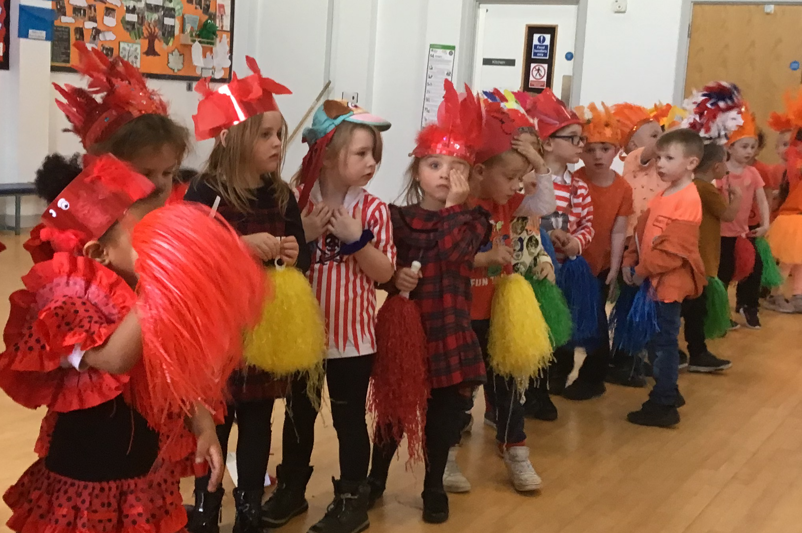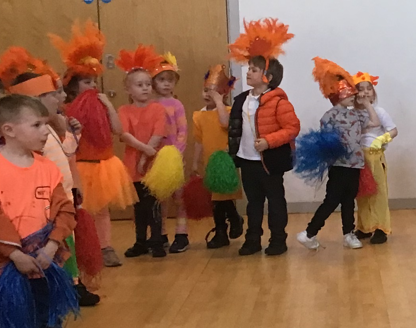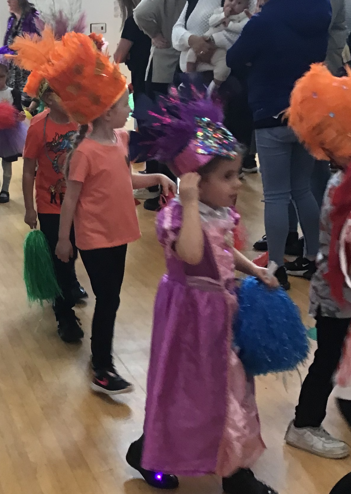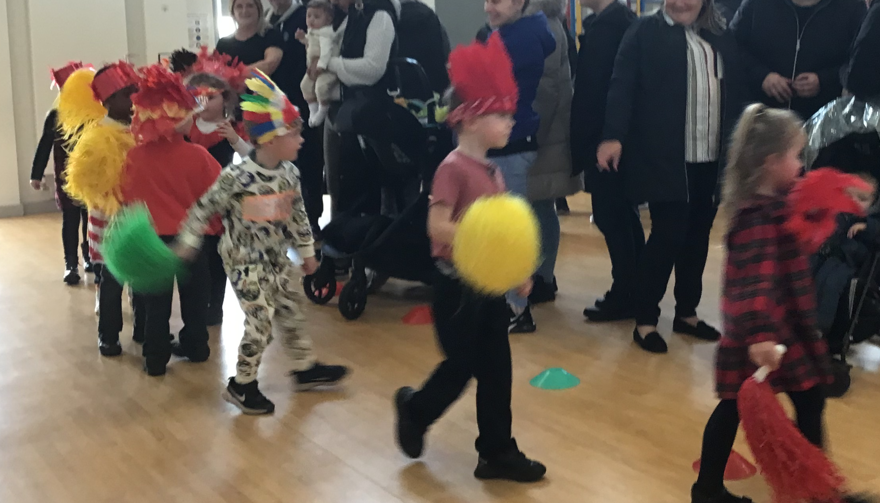MUsic

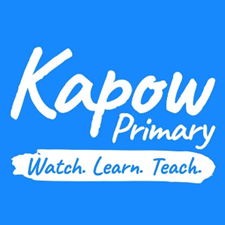
INTENT
We use the Kapow Primary Music Scheme from F2 to Year 6. The intention of the Kapow Primary music scheme is to help children to feel that they are musical and to develop a life-long love of music. We focus on developing the skills, knowledge and understanding that children need in order to become confident performers, composers and listeners. Our curriculum introduces children to music from all around the world and across generations, teaching children to respect and appreciate the music of all traditions and communities.
Children will develop the musical skills of singing, playing tuned and untuned instruments, improvising and composing music, and listening and responding to music. They will develop an understanding of the history and cultural context of the music that they listen to and learn how music can be written down. Through music, our curriculum helps children develop transferable skills such as team-working, leadership, creative thinking, problem-solving, decision-making, and presentation and performance skills. These skills are vital to children’s development as learners and have a wider application in their general lives outside and beyond school.
Kapow Primary’s Music scheme of work enables pupils to meet the end of key stage attainment targets outlined in the national curriculum and the aims of the scheme align with the national curriculum.
Music is taught in EYFS through Monster Phonics (F1), Kapow (F2), daily routines and through continuous provision.
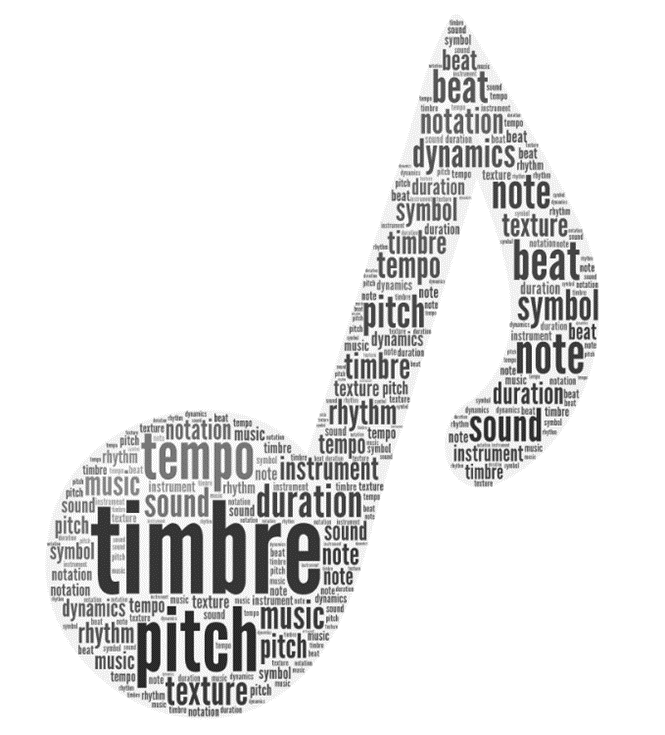
IMPLEMENTATION
Lessons are taught following the Kapow Scheme from F2 to Year 6. Each five-lesson unit combines the strands of: performing, listening, composing, the history of music and the inter-related dimensions of music to capture pupils’ imagination and encourage them to explore music enthusiastically.
The Kapow Primary scheme follows the spiral curriculum model where previous skills and knowledge are returned to and built upon. Children progress in terms of tackling more complex tasks and doing more simple tasks better, as well as developing an understanding and knowledge of the history of music, staff, and other musical notations as well as the interrelated dimensions of music and more.
In each lesson, pupils will actively participate in musical activities drawn from a range of styles and traditions, developing their musical skills and their understanding of how music works. Lessons incorporate a range of teaching strategies, from independent tasks, paired and group work, as well as improvisation and teacher-led performances. Lessons are ‘hands-on’ and incorporate movement and dance elements, as well as making cross-curricular links with other areas of learning.
From Key stage 2, the history of music is also introduced, giving the children opportunities to deepen their understanding further about how music has developed over time and how genres differ in their origins.
Key Vocabulary
The key vocabulary is built upon across the scheme and is in alignment with the Oracy project at Holgate Primary and Nursery. The terminology is introduced in a step-by-step manner and increases in complexity across the years, starting with beat and pulse in year 1, ranging up to octaves, harmonies and the 12-bar blues in years 5 and 6. Because of the nature of the spiral curriculum, this is revisited and often allows the children to spot similarities and differences in the different genres and themes of music.
Tuition
Within school we also have a variety of different opportunities available for children to sign up and learn an instrument in greater depth, on a 121 or small group ensemble basis. We currently do this through Create music who specialise in the guitar and ukele and RockSteady who specialise in different instruments, playing together within a band. This is continuing into the next academic year. This also allows the children the opportunity to perform in front of parents, carers, the school and their peers and develops relation ship building in alignment with developing their musciality.
Extra-Curricular Opportunities
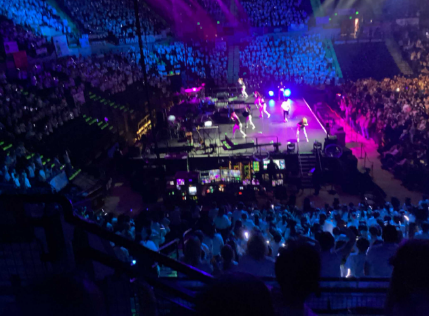
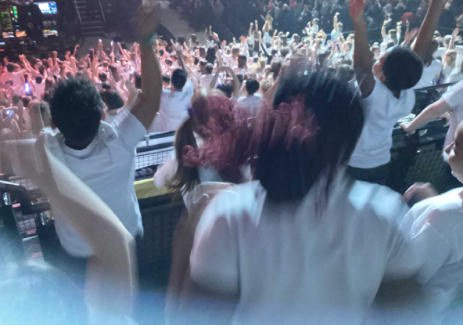
Children are able to participate in clubs taking place in lunchtimes or after school which link to music in a variety of ways. The clubs on offer for the next academic year include Glee, Choir, Drama, Dance and Music. As part of this, the children also then have an opportunity to participate in collective performances such as the Young Voices Concert at Utilia in Sheffield, the Transform Trust Choir at the Albert Hall in Nottingham and giving back to the community by visiting residential homes in the nearby area.
IMPACT
The Kapow scheme is supplemented with stand alone lessons covering the different terminology within music, the interrelated dimensions of music and to develop children to become ‘more musical’. In addition to this, in years1, 2, 3, 4 and 5 expertise teaching within a class ensemble group is delivered to allow children to learn and develop skills in playing tuned instruments. This follows the Model Music Curriculum and again supplements the teaching of music through Kapow, allowing the children to have a deeper understanding of musical vocabulary, terms and teamwork and offers the opportunity for performance. This is going to expand in 2025-2026 academic year, with the addition of whole class ensemble teaching delivered by both Inspire Music and Create Music.
Throughout the year, children are offerred the opportunity to watch and participate in live music, through performing as part of their class assembly, through Create Music and RockSteady and through different opportunities watching live performances using different partnerships. Holgate Primary achieved the status of being a ‘Music Mark’ school for our commitment to providing high quality music education for children and young people. This has opened additional opportunities for the children to participate, listen to and appreciate a variety of genres of music across the year.
Music is also a key element of F1 phonics taught through the Monster Phonics scheme. F1 children explore a range of different sounds including environmental sounds, quiet and loud sounds. They learn to join in with a rhythm using musical instruments and learn the names of different instruments. Instruments are used as part of storytelling.
Music in the EYFS - Expressive Arts and Design – Being Imaginative and Expressive
The children enjoyed their music lesson. Following a rhythm, keeping the beat and listening to each other.
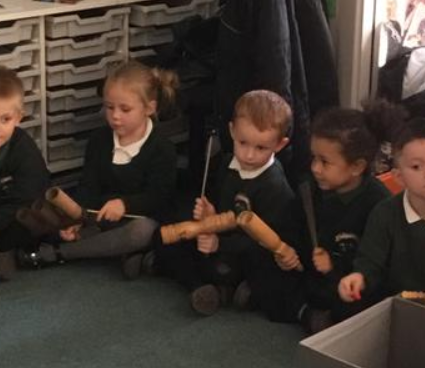
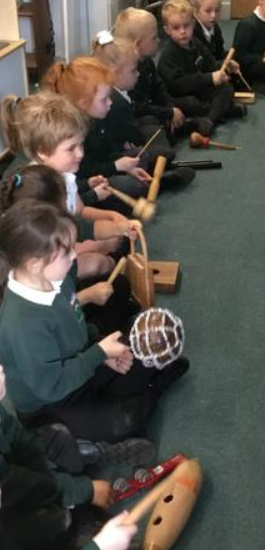
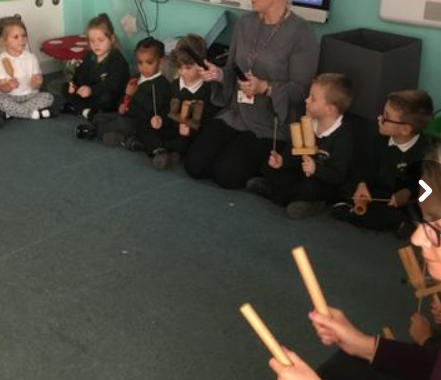
Celebrating carnival time during our Vehicle - making music and dancing.
